公开课——情态动词ppt课件
合集下载
情态动词讲解精ppt课件

例句
will/would
详细描述:will 表示现在的意愿或 预测,would 表示过去的或虚拟 的意愿或预测。
1. I will help you with your project.(我会帮助你完成你的项 目。)
总结词:表示意愿或预测
例句
2. They would have gone to the party if they had known about it earlier.(如果他们早点 知道,他们就会去参加聚会。)
表示意愿
情态动词+动词原形,如 would like to go,表示 某人想要去。
形式变化
基本形式
情态动词的基本形式包括 现在时、过去时和将来时 。
过去式
情态动词的过去式通常是 在基本形式后面加-d或ed,如could have done 、should have done等。
将来时
情态动词的将来时通常是 在基本形式后面加-will或shall,如will be able to 、shall have to等。
may与might的区别与联系
总结词
may表示现在的许可或可能性;might表示过去的可能性或许可。
详细描述
may用于肯定句中,表示许可或可能性,例如“You may use this room.”(你可以使用这个房间。 )“The book may be in the library.”(这本书可能在图书馆里。)might表示过去的可能性,常 用于过去时态的句子中,例如“He might come tomorrow.”(他明天可能来。)
未必、很难说
She might not agree with us.
表示虚拟语气
will/would
详细描述:will 表示现在的意愿或 预测,would 表示过去的或虚拟 的意愿或预测。
1. I will help you with your project.(我会帮助你完成你的项 目。)
总结词:表示意愿或预测
例句
2. They would have gone to the party if they had known about it earlier.(如果他们早点 知道,他们就会去参加聚会。)
表示意愿
情态动词+动词原形,如 would like to go,表示 某人想要去。
形式变化
基本形式
情态动词的基本形式包括 现在时、过去时和将来时 。
过去式
情态动词的过去式通常是 在基本形式后面加-d或ed,如could have done 、should have done等。
将来时
情态动词的将来时通常是 在基本形式后面加-will或shall,如will be able to 、shall have to等。
may与might的区别与联系
总结词
may表示现在的许可或可能性;might表示过去的可能性或许可。
详细描述
may用于肯定句中,表示许可或可能性,例如“You may use this room.”(你可以使用这个房间。 )“The book may be in the library.”(这本书可能在图书馆里。)might表示过去的可能性,常 用于过去时态的句子中,例如“He might come tomorrow.”(他明天可能来。)
未必、很难说
She might not agree with us.
表示虚拟语气
《情态动词》PPT课件
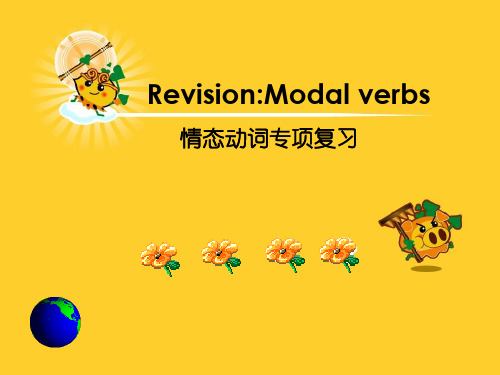
work our this problem. 如果你睡个好觉,那么你就能做出这个题目。 3、表示过去的能力: could表示过去一般的能力, 但不表示做或未做某事;
was/ were able to表示过去有能力并且成功地做了某事, 相当于managed to do something/ succeeded in doing something;
• Mr. Bush is on time for everything. How can it be that he was late for the opening ceremony? (表疑惑、惊讶)
表示请求、允许、允诺
1. 当对方是决策者时,你代表你(们)自己(I, We),或代表第三者(he,she,they)向对方 (you)请示或提出建议时用:
Revision:Modal verbs
情态动词专项复习
How many modal verbs
do you remember?
(情态动词)
一,常见的情态动词有:can, could, may, might ,must, shall, should, will, would, need, have to等
4、具有情态动词的某些特征的有:have(had) to, used to.
情态动词的特征
1、有一定的词义,但不能单独作谓语,它们要和行 为动词或连系动词连用,构成谓语。
2、适用于主语的各种人称和数 have to例外,主语 是第三人称单数时,要用has to)。如:
We/ He must work hard. 我们/他一定要努力工作。 I have to walk home. 我得步行回家。 He has to walk home. 他得步行回家。
was/ were able to表示过去有能力并且成功地做了某事, 相当于managed to do something/ succeeded in doing something;
• Mr. Bush is on time for everything. How can it be that he was late for the opening ceremony? (表疑惑、惊讶)
表示请求、允许、允诺
1. 当对方是决策者时,你代表你(们)自己(I, We),或代表第三者(he,she,they)向对方 (you)请示或提出建议时用:
Revision:Modal verbs
情态动词专项复习
How many modal verbs
do you remember?
(情态动词)
一,常见的情态动词有:can, could, may, might ,must, shall, should, will, would, need, have to等
4、具有情态动词的某些特征的有:have(had) to, used to.
情态动词的特征
1、有一定的词义,但不能单独作谓语,它们要和行 为动词或连系动词连用,构成谓语。
2、适用于主语的各种人称和数 have to例外,主语 是第三人称单数时,要用has to)。如:
We/ He must work hard. 我们/他一定要努力工作。 I have to walk home. 我得步行回家。 He has to walk home. 他得步行回家。
情态动词专题知识公开课获奖课件

第7页
②在予以他人许可时,常用can,但有时也用may。不能用 might。
-May I play basketball this afternoon? 今天下午我可以打篮球吗? -Yes,you may. 行,可以。
第8页
(2)表达也许性 may和might表达也许性时,可以对目前、过去或未来进行 推测。 Peter may e with us tonight,but he isn't sure yet. 彼得今晚也许和我们一起来,但他还没确定。 He might be studying in the classroom. 他也许正在教室里学习。
用于必定句,表示对
taken the other road.It might have
过去没有做某事遗憾,意思 been quicker.可能我们本应走另一
should/ou 为“原来能够……(但实际 条路,那样可能更加快些。
第17页
(3)用于法律、公约、约定等正式条文,重要用于第三人称。 Students shall remain in their seats until all the papers have been collected. 试卷所有收回后学生方可离开座位。
第18页
5. will和would使用措施 作情态动词will,would与作助动词will,would多种形式相 似。 (1)表达自愿做或积极提出做什么,如意志、愿望或决心等。 would用于过去状况。
第14页
The TV set is broken. I have to buy a new one. 电视机坏了。我不得不再买台新。 The students will have to know how to use the puters. 学生将必须理解怎样使用电脑。 He had to go,because his mother was ill. 他不得不离开,由于他母亲病了。
②在予以他人许可时,常用can,但有时也用may。不能用 might。
-May I play basketball this afternoon? 今天下午我可以打篮球吗? -Yes,you may. 行,可以。
第8页
(2)表达也许性 may和might表达也许性时,可以对目前、过去或未来进行 推测。 Peter may e with us tonight,but he isn't sure yet. 彼得今晚也许和我们一起来,但他还没确定。 He might be studying in the classroom. 他也许正在教室里学习。
用于必定句,表示对
taken the other road.It might have
过去没有做某事遗憾,意思 been quicker.可能我们本应走另一
should/ou 为“原来能够……(但实际 条路,那样可能更加快些。
第17页
(3)用于法律、公约、约定等正式条文,重要用于第三人称。 Students shall remain in their seats until all the papers have been collected. 试卷所有收回后学生方可离开座位。
第18页
5. will和would使用措施 作情态动词will,would与作助动词will,would多种形式相 似。 (1)表达自愿做或积极提出做什么,如意志、愿望或决心等。 would用于过去状况。
第14页
The TV set is broken. I have to buy a new one. 电视机坏了。我不得不再买台新。 The students will have to know how to use the puters. 学生将必须理解怎样使用电脑。 He had to go,because his mother was ill. 他不得不离开,由于他母亲病了。
情态动词语法 ppt课件

ppt课件 3
(3) 表示客观可能性即推测用法,多用于否定句和疑问句中, could只表示可能性比can小,不表时态。(否定推测) —Who is that man? Can it be your uncle? —No, it can’t be him. (4) can 也用在肯定陈述句中,表示理论上的可能性,意为“有 时可能会” Anybody can make mistakes. Even top students can make mistakes in the exam. 即使优秀学生在考试中也可能会出错。
ppt课件
14
(3)shall用在主语是第三人称的陈述句中,表示条约,规章,法令 等文件中表示义务或规定, 常用于官方文件中,表明具有法律效 力。(而should表示应该,义务)。 All payments shall be paid by the end of the month. 本月底所有款项必须付清。 No person shall carry a mobil phone into the examination room during the College Extrance Examination.
ppt课件 7
(2)may和might的用法
1. may和might表示请求、许可。 表示征求同意和允许,表征求同意时,might比may的语气更委 婉一些,否定回答时要用mustn’t表示“不可以”、“禁止”、“阻止” 之意。 may表示“允许”,否定形式为mustn't/can't,表示“禁止、不允 许、不可以”如: You may keep the book for a week. 这本书你可以保留一星期。 — Might I use your pen? — Yes, you may/can. —No, you mustn't/can't.
(3) 表示客观可能性即推测用法,多用于否定句和疑问句中, could只表示可能性比can小,不表时态。(否定推测) —Who is that man? Can it be your uncle? —No, it can’t be him. (4) can 也用在肯定陈述句中,表示理论上的可能性,意为“有 时可能会” Anybody can make mistakes. Even top students can make mistakes in the exam. 即使优秀学生在考试中也可能会出错。
ppt课件
14
(3)shall用在主语是第三人称的陈述句中,表示条约,规章,法令 等文件中表示义务或规定, 常用于官方文件中,表明具有法律效 力。(而should表示应该,义务)。 All payments shall be paid by the end of the month. 本月底所有款项必须付清。 No person shall carry a mobil phone into the examination room during the College Extrance Examination.
ppt课件 7
(2)may和might的用法
1. may和might表示请求、许可。 表示征求同意和允许,表征求同意时,might比may的语气更委 婉一些,否定回答时要用mustn’t表示“不可以”、“禁止”、“阻止” 之意。 may表示“允许”,否定形式为mustn't/can't,表示“禁止、不允 许、不可以”如: You may keep the book for a week. 这本书你可以保留一星期。 — Might I use your pen? — Yes, you may/can. —No, you mustn't/can't.
情态动词ppt课件市公开课获奖课件省名师示范课获奖课件

I don’t like this TV set. We must buy a new one. There was no more bus. They had to walk home.
• (2) must旳否定形式mustn’t表达禁止, 意思是“不能,不许”。例如:
• (2023上海春)When I was young, I was told that I ______ play with matches
B. it is used to
• C. it was used to
D. it used to be
• 【答案】A D
(三)情态动词+have done
• must表达对某人某事旳猜测;对过去发生旳 事情作肯定判断用must have done
There is nobody here. They must have all gone home.
• can用于肯定句中表达一种理论上旳可能性, 并不牵涉是否真旳会发生;
• The road can be blocked. • could用于肯定句中,语气比can更弱。
• (4)may (not) / might (not)体现一种不太把 握旳推测,意为“或许,可能”;might旳 语气比may较婉转.
• A. might B. should C. could D. would
• 【答案】D
• (2) would表达过去倾向性或习惯性旳动作。 used to 也有这一使用方法,但used to即 可用来体现过去旳习惯性旳动作,也可用 来表达过去旳状态。例如:
• ① (NMET1996上海)When he was there, he ___ go to that coffee shop at the corner after work every day.
• (2) must旳否定形式mustn’t表达禁止, 意思是“不能,不许”。例如:
• (2023上海春)When I was young, I was told that I ______ play with matches
B. it is used to
• C. it was used to
D. it used to be
• 【答案】A D
(三)情态动词+have done
• must表达对某人某事旳猜测;对过去发生旳 事情作肯定判断用must have done
There is nobody here. They must have all gone home.
• can用于肯定句中表达一种理论上旳可能性, 并不牵涉是否真旳会发生;
• The road can be blocked. • could用于肯定句中,语气比can更弱。
• (4)may (not) / might (not)体现一种不太把 握旳推测,意为“或许,可能”;might旳 语气比may较婉转.
• A. might B. should C. could D. would
• 【答案】D
• (2) would表达过去倾向性或习惯性旳动作。 used to 也有这一使用方法,但used to即 可用来体现过去旳习惯性旳动作,也可用 来表达过去旳状态。例如:
• ① (NMET1996上海)When he was there, he ___ go to that coffee shop at the corner after work every day.
情态动词语法讲解PPT课件
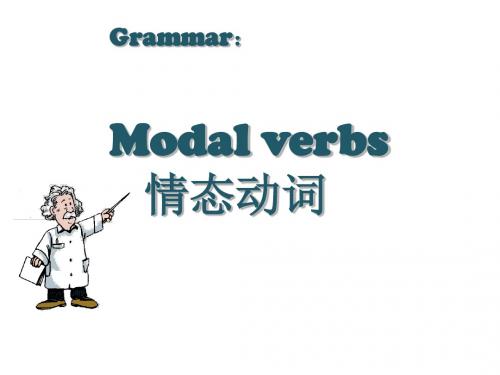
2表示“许可”和“不许”
a)请求对方“许可”可用can, could, may, might.
may/might较正式,could/might较委婉
表示给予“许可”通常用can/may,而不用 could/might
Could I use your phone? Yes, of course you can. Might I trouble you for a light? You may indeed.
表示将来的“必须”,常用have to的一定 形式(will/shall have to) 比较:
•We must do it again.(表示现在)
•We’ll have to do it again.(表示将来)
•表示过去的“必须”,常用had to
•I had to leave at six yesterday.
•They must be home by now.(他们现在一定到家了)
will/would表示“推测”可有三种情况
1)对特定事态的推测
A: Who’s that man over there? B: That will be George, no doubt. C: That would be George, I except.
• Can they have missed the bus?
• Yes, they may have.
may not重音落在助动词上,表示 “不可能”,重音落在否定词上,表 示“不许可” , 比较:
•He may not go tomorrow.
•He may not go tomorrow.
•所以在书面语中,表示“不可能” 常用can’t
小学英语语法课件-情态动词can (共34张PPT) 全国通用
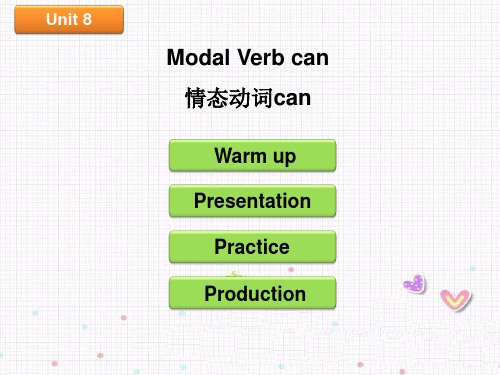
是的,可以。而且你还可以吃些蛋糕。 Birds can fly very high.
Hippos can’t fly and walk.
Lucy不可能在教室里面。
Presentation Sentences
Ostcrichacnan在’t fl句y. 子中表示允许,意为“可以” ,在口语中可以代替may。
Presentation Sentences
Can you please lend me your car? 你能借给我你的车用用吗? Could you help me with my English? 你能帮助我学英语吗?
can在句中表示请求,常用于“Can/Could you…?”句式。 can的过去式could用于现在时,可是语气更委婉,更客气。
What can bats do?
What can it do?
What can hippos do?
Can I come in ? 我可以进来吗? Can / Can’t I sit down?
Presentation Sentences
Dolphins can jump high and do tricks.
Practice Oral Practice 表示请求和许可:
我现在可以走了吗? 是的,可以。 不,不可以。
_C__a_n__ I go now? — Yes, you ___c_a_n_____. — No, you ___c_a_n_’_t____.
表示客观可能性:
Lucy不可能在教室里面。 Lucy _c_a_n_’_t___ be in the classroom.
— Can / Can’t he speak Japanese? — Yes, he can / can’t, but not well.
我的公开课情态动词课件

2. —What’s the name of the book? —Khulaifi. _________ I spell it for you? A. Shall B. Would C. Can D. Might
情态动词表必要性
• must • need
高考真题演练
must 表“必须”
mustn’t 禁止
A. might B. must C. would D. can
3. What do you mean, there are only ten tickets? There ______ be twelve.
A. should B. would C. will D. shall
4. It is usually warm in my hometown in March, but it _____ be rather cold sometimes.
1. 不必须
don’t have to needn’t do
don’t need to
2. must还可表示“偏偏、偏要” e.g. Must you make so much noise?
• You ___ buy a gift, but you can if you want to.
• must
1. 常用于否定句或疑问句。 e.g. You can’t be hungry already — you had
lunch only two hours ago!
2. can用于肯定句中表示理论上的可能性,并不 牵涉是否真的会发生
e.g. You can hurt yourself if you play in the street.
A. must B. can C. should D. would
情态动词全部ppt课件

A.must
B.would
C.should
D.might
19
• 翻译 • ----我能在这个房间抽烟吗? .
---- 可以。 ---- 不行,… ----Might/ May I smoke in this room?
---- Yes, you can.
---- No, you mustn’t
20
rule.
(威胁)
26
Shall 决心、承诺、警告、命令 you \he\she\they shall…..(二三人称陈述)
When the chairman turns up, nobody shall say a word. 命令 Students shall remain in their seats until the papers have been
28
5. should
1. should表示义务、职责、劝告,意 为 “应该”。
eg: You should keep your promise. Students should respect teachers.
29
2)表示说话人_惊_讶______等特殊情感。
It’s surprising that Mary should not know Lei Feng.
3.must, need没有时态,但有些情态动词如can、 may,will,have to有一般式和过去式的变化。
4. 情态动词不能单独做谓语,必须和实义动词原形 一起构成谓语。
3
情态动词的“时态”形式并不是时间区 别的 主要标志, 不少情况下, 情态动词的 现在式 形式和过去式形式都可用来表 示现在时 间、过去时间和将来时间。
七年级-情态动词ppt

can't have done 的语气比 couldn't have done 要强一些
以could或would提问时,不能再以 could或would作答,而应该用can或will。 如: —Could I borrow your dictionary? —Yes, of course you can.
2.表示“必须”这个意思时,must 和 have to 稍有区别。must着重说明主观 看法,have to 强调客观需要。另外, have to 能用于更多时态。
I don’t like this TV set. We must buy a new one. There was no more bus. They had to walk home.
只作情态动词的 can / could, may / might, ought to, must
可情态可实义的 need, dare 可情态可助动词的 shall / should, will /
would 相当于情态动词的 have to, used to
can 和could:
1) can的主要用法是: A. 表示体力或脑力的能力:
I’d like to…
would表示过去的习惯,后接动词原形,意 为“总是,总会” e.g. He would sit near the fire for hours on winter evenings. e.g. When I was a child, I would go swimming with other children in summer.
dropped it can’t/couldn’t have done: 用于否定句时表否定推断,推
以could或would提问时,不能再以 could或would作答,而应该用can或will。 如: —Could I borrow your dictionary? —Yes, of course you can.
2.表示“必须”这个意思时,must 和 have to 稍有区别。must着重说明主观 看法,have to 强调客观需要。另外, have to 能用于更多时态。
I don’t like this TV set. We must buy a new one. There was no more bus. They had to walk home.
只作情态动词的 can / could, may / might, ought to, must
可情态可实义的 need, dare 可情态可助动词的 shall / should, will /
would 相当于情态动词的 have to, used to
can 和could:
1) can的主要用法是: A. 表示体力或脑力的能力:
I’d like to…
would表示过去的习惯,后接动词原形,意 为“总是,总会” e.g. He would sit near the fire for hours on winter evenings. e.g. When I was a child, I would go swimming with other children in summer.
dropped it can’t/couldn’t have done: 用于否定句时表否定推断,推
情态动词的用法PPT课件
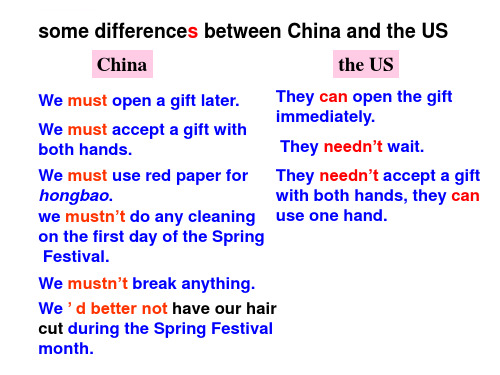
“雪亮工程"是以区(县)、乡(镇) 、村( 社区) 三级综 治中心 为指挥 平台、 以综治 信息化 为支撑 、以网 格化管 理为基 础、以 公共安 全视频 监控联 网应用 为重点 的“群 众性治 安防控 工程” 。
Exercises:
My brother was very ill, so I ( had to) call the doctor in the middle of the night.
“雪亮工程"是以区(县)、乡(镇) 、村( 社区) 三级综 治中心 为指挥 平台、 以综治 信息化 为支撑 、以网 格化管 理为基 础、以 公共安 全视频 监控联 网应用 为重点 的“群 众性治 安防控 工程” 。
some differences between China and the US
China
3 Underline the correct words.
注意: might为may的过去式,但也可以代替may, 语气较为婉转客气或更加不肯定。
“雪亮工程"是以区(县)、乡(镇) 、村( 社区) 三级综 治中心 为指挥 平台、 以综治 信息化 为支撑 、以网 格化管 理为基 础、以 公共安 全视频 监控联 网应用 为重点 的“群 众性治 安防控 工程” 。
— For your health, I’m afraid you ______. (2011贵州安顺)
A. may B. can C. have to D. need
“雪亮工程"是以区(县)、乡(镇) 、村( 社区) 三级综 治中心 为指挥 平台、 以综治 信息化 为支撑 、以网 格化管 理为基 础、以 公共安 全视频 监控联 网应用 为重点 的“群 众性治 安防控 工程” 。
初中英语-情态动词-课件(共31张PPT)

二、情态动词的用法 4.dare和need
need “需要” dare“敢” 可作情态动词也可作实义动词
• (2)当实义动词使用时,有人称和时态的变化 • e.g.You don't need to do it yourself. • He did not dare(to) look up.
• ——Can you drive a car at present? • ——I_____ do so in the busy street.
• A.may not C.daren't
B.don't dare D.needn't
二、情态动词的用法 ed to和had better
• (1)used to表示过去的习惯动作或状态,现 已不存在。
• e.g.There used to be our playground.
二、情态动词的用法 ed to和had better
time. • I'll not be able to come this afternoon.
二、情态动词的用法
• (2)表客观可能性,在疑问句中表示请求或许可 • e.g.Man can not live without air. • Can I use your pen?
• *could是can的过去时,主要用于疑问句,表示语气委婉。 • 肯定回答用 • 否定回答可用
C.should tell
D.should have told
二、情态动词的用法 7.will和would
(1)表意愿,用于各种人称的陈述句。
• e.g.I will do anything for you. • If you will read the book,I'll lend it to you.
情态动词 专题课件(共28张PPT)
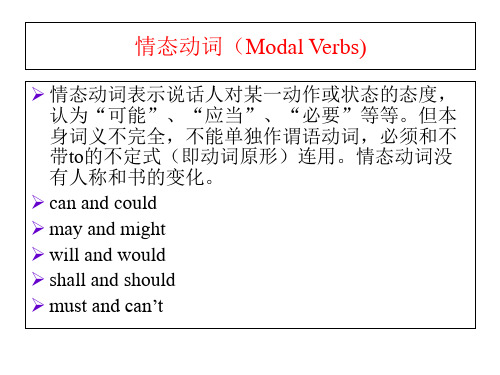
➢ 5. (may/can) ____c_a_n_____you swim? 表示能力
➢ 6. Listen, please. You (may not/might not)
____m__a_y__n_o_t______ speak during this exam.
表示不允许
may, might, can, could
may, might, can, could
表示猜测
➢ 1. They (can/might) ____m_i_g_h_t___be away for the
weekend but I’m not sure.
表示许可
➢ 2. You (may/might) ___m__a_y____leave now if you
can and could
➢So he can carry heavy books. ➢ability ➢He couldn't open the door by himself. ➢ability ➢Could you open the door, please? ➢request
can and could
表示猜测(不可能)
➢7. They (can not/may not) ___c_a_n_n_o_t_______ still be out, the light is on in the house.
➢8. You (couldn’t/might not) 表示许可
____c_o_u_ld_n_’_t_______ smoke on the bus.
➢9. With luck, tomorrow (can/could) ___c_o_u_ld____be a cooler day. 表示猜测
初中英语语法大全——情态动词(共25张PPT)

三. must的用法
1.表示必须 must表示必须多指现在或将来的情况,强调说话者的主观语气即说话者认 为有必要或有义务做某事。对其一般疑问句的肯同答用must,否定回答用 needn't或者don't have to。 Everyone must take notes carefully in Professor Liu’s class. Must I finish the work tonight ? ---Yes, you must. --- No, you needn’t /don't have to.
九、had better的用法
1. 表示劝告或建议 eg: You' d better eat these bananas before they go ba d. 2. had better的否定形式 其否定形式是将not直接放在had better的后面。 eg: You had better not miss the last bus.
3.表示请求或允许 (1)用could 比用can更加迟疑不决,当没有把握得到允许或需 要委婉表达时用could。 eg: Could I take this seat, sir, if you don't mind? eg: You can phone me after six this afternoon. 当允许别人做某事时,答语用cause your cell phone for a while? --- Yes, of course you can.
五. will/would的用法
1、表示意愿 表示自愿做或主动提出做建电如意志 愿望或决心等,可用于各种 人称。would是will的过去式。 eg: I won’t argue with you.我不愿意和你争辩。 eg: Jane said she would not go with Tom, for she didn’t like him. 简说她不愿和汤姆一起去,因为她不喜欢他。
情态动词讲解ppt课件-精品文档35页PPT

情态动词讲解ppt课件-精品 文档
26、机遇对于有准备的头脑有特别的 亲和力 。 27、自信是人格的核心。
28、目标的坚定是性格中最必要的力 量泉源 之一, 也是成 功的利 器之一 。没有 它,天 才也会 在矛盾 无定的 迷径中 ,徒劳 无功。- -查士 德斐尔 爵士。 29、困难就是机遇。--温斯顿.丘吉 尔。 30、我奋斗,所以我快乐。--格林斯 潘。
▪
26、要使整个人生都过得舒适、愉快,这是不可能的,因为人类必须具备一种能应付逆境的态度。——卢梭
▪
27、只有把抱怨环境的心情,化为上进的力量,才是成功的保证。——罗曼·罗兰
▪
28、知之者不如好之者,好之者不如乐之者。——孔子
▪
29、勇猛、大胆和坚定的决心能够抵得上武器的精良。——达·芬奇
▪
30、意志是一个强壮的盲人,倚靠在明眼的跛子肩上。——叔本华
谢谢!
35
26、机遇对于有准备的头脑有特别的 亲和力 。 27、自信是人格的核心。
28、目标的坚定是性格中最必要的力 量泉源 之一, 也是成 功的利 器之一 。没有 它,天 才也会 在矛盾 无定的 迷径中 ,徒劳 无功。- -查士 德斐尔 爵士。 29、困难就是机遇。--温斯顿.丘吉 尔。 30、我奋斗,所以我快乐。--格林斯 潘。
▪
26、要使整个人生都过得舒适、愉快,这是不可能的,因为人类必须具备一种能应付逆境的态度。——卢梭
▪
27、只有把抱怨环境的心情,化为上进的力量,才是成功的保证。——罗曼·罗兰
▪
28、知之者不如好之者,好之者不如乐之者。——孔子
▪
29、勇猛、大胆和坚定的决心能够抵得上武器的精良。——达·芬奇
▪
30、意志是一个强壮的盲人,倚靠在明眼的跛子肩上。——叔本华
谢谢!
35
情态动词公开课PPT课件

It’s too hot to take
exercise in the
afternoon.
Shall we do the training in the morning?
第22页/共47页
shall: 1.Shall用于第一、第三人称疑问
句中,表示说话人征求对方的意 见、向对方请示或提供帮助 。
1.Shall we begin our lesson?
How delicious
!!!
You should not/ought not to
eat so much before running.
第31页/共47页
should:
1.Should表示劝告、建议、命令, 其同义词是ought to;在疑问句中, 通常用should代替ought…to。
Should I open the window? W ot我hee们srh.应ou当ld要le相ar互n 学fr习om。each
第20页/共47页
5.Making requests (提出要求):
informal
formal
will
can
could
would
I don’t know how to use this equipment!
Can you help me with my training?
第21页/共47页
6.Making suggestions (提出建议):
/No, you can’t/mustn’t.
第19页/共47页
may/might:
2.用于祈使句中表示祝愿。 May you be happy all your life.
Ma祝y你yo成u 功su!cceed. 3.表示推测、可能(只用于肯定句, 疑问句则要用can或could)。
exercise in the
afternoon.
Shall we do the training in the morning?
第22页/共47页
shall: 1.Shall用于第一、第三人称疑问
句中,表示说话人征求对方的意 见、向对方请示或提供帮助 。
1.Shall we begin our lesson?
How delicious
!!!
You should not/ought not to
eat so much before running.
第31页/共47页
should:
1.Should表示劝告、建议、命令, 其同义词是ought to;在疑问句中, 通常用should代替ought…to。
Should I open the window? W ot我hee们srh.应ou当ld要le相ar互n 学fr习om。each
第20页/共47页
5.Making requests (提出要求):
informal
formal
will
can
could
would
I don’t know how to use this equipment!
Can you help me with my training?
第21页/共47页
6.Making suggestions (提出建议):
/No, you can’t/mustn’t.
第19页/共47页
may/might:
2.用于祈使句中表示祝愿。 May you be happy all your life.
Ma祝y你yo成u 功su!cceed. 3.表示推测、可能(只用于肯定句, 疑问句则要用can或could)。
- 1、下载文档前请自行甄别文档内容的完整性,平台不提供额外的编辑、内容补充、找答案等附加服务。
- 2、"仅部分预览"的文档,不可在线预览部分如存在完整性等问题,可反馈申请退款(可完整预览的文档不适用该条件!)。
- 3、如文档侵犯您的权益,请联系客服反馈,我们会尽快为您处理(人工客服工作时间:9:00-18:30)。
高中英语语法复习
1
一、情情态态动词动表词能力语法(目能录够)
二、情态动词表请求、允许 (能不能) 三、情态动词表必要性 (必须) 四、情态动词表推测 (可能)
五、情态动词+have done
2
情态动词表能力
11.. cIacnan表/ a示m现a在ble的t能o s力wim. 22.. cIocuoludld表/ 示wa过s 去ab的le能to力climb a tree when I
3. used to do “过去常常,强调现在不了” would表示“过去常常”;
6
1. When he was there, he ___ go to that coffee shop at the corner every day.
A. would
B. should
C. had better
mustn’t 禁止
1. 不必须
don’t have to needn’t do
don’t need to
2. must还可表示“偏偏、偏要” e.g. Must you make so much noise?
9
1. You ___ buy a gift, but you can if you want to.
10
情态动词表推测
可能性的强弱层次
must > should/ought to > can/could >
may/might
高考真题演练
11
must表示推测
1. 可能性最强,只能用于肯定句 e.g. That must be my pen.
2. must ---- 很可能
can’t ---- 不可能
A. might B. must C. would D. can
16
3. What do you mean, there are only ten tickets? There ______ be twelve.
A. should B. would C. will D. shall
14
may/ might表示推测
1. can not 不可能 may not 可能不
2. may well “极有可能” e.g. Liza may well not want to go on the trip
--- she hates traveling.
3. may/ might as well “不妨” e.g. You may as well stay for dinner.
A. must
B. mustn’t
C. have to
D. don’t have to
2. When I was young, I was told that I ______ play with fire.
A. wouldn't B. needn't C. mustn't D. daren't
3. - May I smoke here ? - If you __, choose a seat in the smoking area. A. should B. could C. may D. must
He shall leave the house at once. The sign reads: No person shall smoke here!
5
will would
1. 用于向第二人称,征求对方意见。 e.g. Would you please open the door?
2. 表示个人主观意愿。 e.g. I will help you anytime.
15
1. That
be Ann’s husband, for I am
sure that he doesn’t wear glasses.
A. can’t
B. may not
C. mustn’t
D. needn’t
2. - Good morning. I got an appointment with Miss Smith yesterday. - Ah, you ______ be Mr. Peter.
D. might
2. —What’s the name of the book? —Khulaifi. _________ I spell it for you? A. Shall B. Would C. Can D. Might
7
情态动词表必要性
• must • need 高考真题演练
8
must 表“必须”
was a child.
3. be able to 表能力,可用于多种时态 3. I will be able to swim next week.
4. be able to 强调成功地做了某事 4. The fire spread through the hotel very
quickly but everyone was able to get out.
3
情态动词表请求、允许
• shall • will、would
高考真题演练
4
shall
1. 用于第一、三人称 ,征求对方意见。 e.g. Shall we begin our class?
Shall he go now?
2. 用于提出命令、允诺,或用于法律、规定 e.g. You shall get my book on Sunday.
e.g. That can’t be my pen.
12
should / ought to表示推测
1. 根据经验的推测,“应当、应该” e.g. You photos should be ready by 12:00. 2. 表示“竟然”,带有感情色彩。 e.g. It is strange that you should like him.
13
Hale Waihona Puke an /could 表示推测1. 常用于否定句或疑问句。 e.g. You can’t be hungry already — you had
lunch only two hours ago!
2. can用于肯定句中表示理论上的可能性,并不 牵涉是否真的会发生
e.g. You can hurt yourself if you play in the street.
1
一、情情态态动词动表词能力语法(目能录够)
二、情态动词表请求、允许 (能不能) 三、情态动词表必要性 (必须) 四、情态动词表推测 (可能)
五、情态动词+have done
2
情态动词表能力
11.. cIacnan表/ a示m现a在ble的t能o s力wim. 22.. cIocuoludld表/ 示wa过s 去ab的le能to力climb a tree when I
3. used to do “过去常常,强调现在不了” would表示“过去常常”;
6
1. When he was there, he ___ go to that coffee shop at the corner every day.
A. would
B. should
C. had better
mustn’t 禁止
1. 不必须
don’t have to needn’t do
don’t need to
2. must还可表示“偏偏、偏要” e.g. Must you make so much noise?
9
1. You ___ buy a gift, but you can if you want to.
10
情态动词表推测
可能性的强弱层次
must > should/ought to > can/could >
may/might
高考真题演练
11
must表示推测
1. 可能性最强,只能用于肯定句 e.g. That must be my pen.
2. must ---- 很可能
can’t ---- 不可能
A. might B. must C. would D. can
16
3. What do you mean, there are only ten tickets? There ______ be twelve.
A. should B. would C. will D. shall
14
may/ might表示推测
1. can not 不可能 may not 可能不
2. may well “极有可能” e.g. Liza may well not want to go on the trip
--- she hates traveling.
3. may/ might as well “不妨” e.g. You may as well stay for dinner.
A. must
B. mustn’t
C. have to
D. don’t have to
2. When I was young, I was told that I ______ play with fire.
A. wouldn't B. needn't C. mustn't D. daren't
3. - May I smoke here ? - If you __, choose a seat in the smoking area. A. should B. could C. may D. must
He shall leave the house at once. The sign reads: No person shall smoke here!
5
will would
1. 用于向第二人称,征求对方意见。 e.g. Would you please open the door?
2. 表示个人主观意愿。 e.g. I will help you anytime.
15
1. That
be Ann’s husband, for I am
sure that he doesn’t wear glasses.
A. can’t
B. may not
C. mustn’t
D. needn’t
2. - Good morning. I got an appointment with Miss Smith yesterday. - Ah, you ______ be Mr. Peter.
D. might
2. —What’s the name of the book? —Khulaifi. _________ I spell it for you? A. Shall B. Would C. Can D. Might
7
情态动词表必要性
• must • need 高考真题演练
8
must 表“必须”
was a child.
3. be able to 表能力,可用于多种时态 3. I will be able to swim next week.
4. be able to 强调成功地做了某事 4. The fire spread through the hotel very
quickly but everyone was able to get out.
3
情态动词表请求、允许
• shall • will、would
高考真题演练
4
shall
1. 用于第一、三人称 ,征求对方意见。 e.g. Shall we begin our class?
Shall he go now?
2. 用于提出命令、允诺,或用于法律、规定 e.g. You shall get my book on Sunday.
e.g. That can’t be my pen.
12
should / ought to表示推测
1. 根据经验的推测,“应当、应该” e.g. You photos should be ready by 12:00. 2. 表示“竟然”,带有感情色彩。 e.g. It is strange that you should like him.
13
Hale Waihona Puke an /could 表示推测1. 常用于否定句或疑问句。 e.g. You can’t be hungry already — you had
lunch only two hours ago!
2. can用于肯定句中表示理论上的可能性,并不 牵涉是否真的会发生
e.g. You can hurt yourself if you play in the street.
